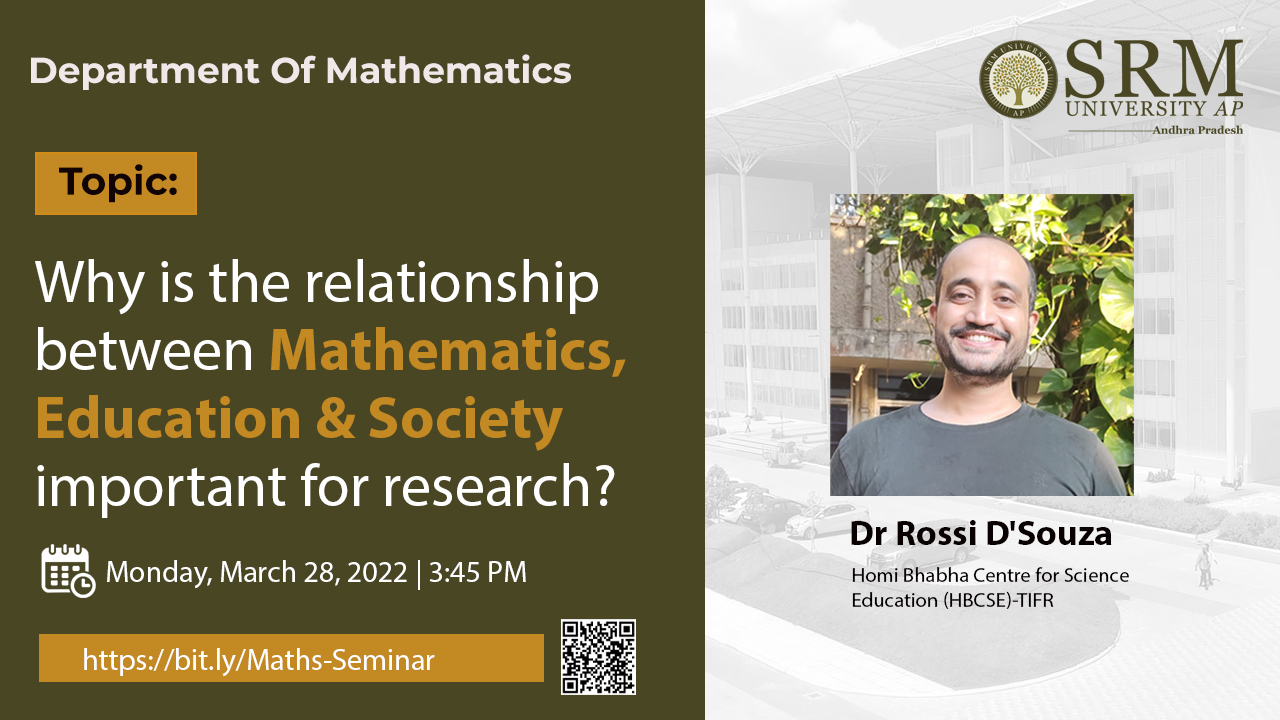Lecture on multiparameter E_0-semigroups
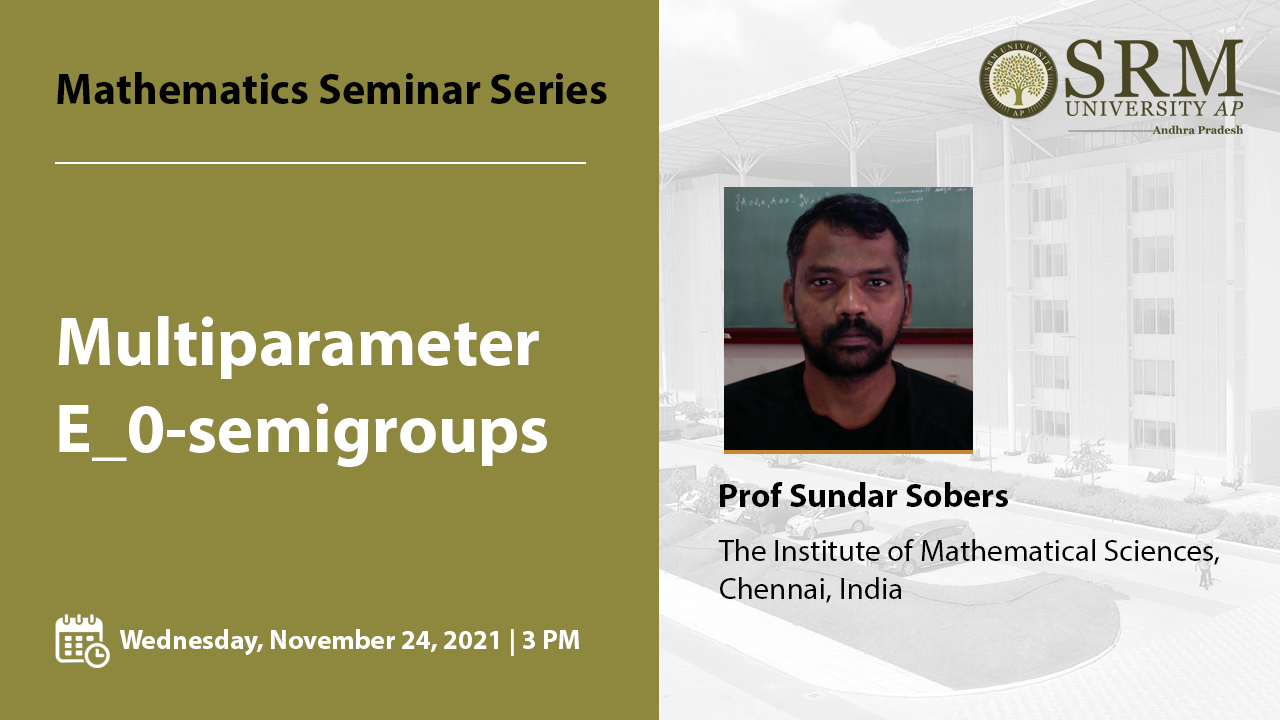 The Department of Mathematics at SRM University-AP is conducting a departmental seminar on November 24, 2021, at 3:00 pm. Prof Sundar Sobers from The Institute of Mathematical Sciences, Chennai, India will engage the participants on the topic “Multiparameter E_0-semigroups”.
The Department of Mathematics at SRM University-AP is conducting a departmental seminar on November 24, 2021, at 3:00 pm. Prof Sundar Sobers from The Institute of Mathematical Sciences, Chennai, India will engage the participants on the topic “Multiparameter E_0-semigroups”.
Abstract of the lecture:
In the late eighties, Powers initiated the study of the 1-parameter semigroup of endomorphisms on B(H). This was further studied intensively by many others during the last three decades led by William Arveson. Although from the physics point of view, the 1-parameter theory is the most important one, from the mathematical perspective, it is not necessary to restrict oneself to 1-parameter, i.e. the half-line [0,\infty) and we could replace the half-line with any reasonable semigroup’ like convex cones in higher-dimensional Euclidean space. One of the nice features is that the basic theory stays intact while there are significant differences between the 1-parameter theory and the n-parameter theory. I will explain one such phenomenon.
In particular, Prof Sundar Sobers will define the basic examples of E_0-semigroups, i.e. the CCR and CAR flow associated with isometric representations of the semigroup P. In the multiparameter world, CCR flows need not be isomorphic to its opposite, a sharp contrast to the one-parameter situation.
Don’t forget to join this lecture on November 24, 2021, at 3:00 pm which will be helpful to participants who are doing or planning to start a career in the multiparameter E_0-semigroups domain.
- Published in Departmental Events, Events, Math Events
Distinguished Lecture Series with Prof Ratnasingham Shivaji
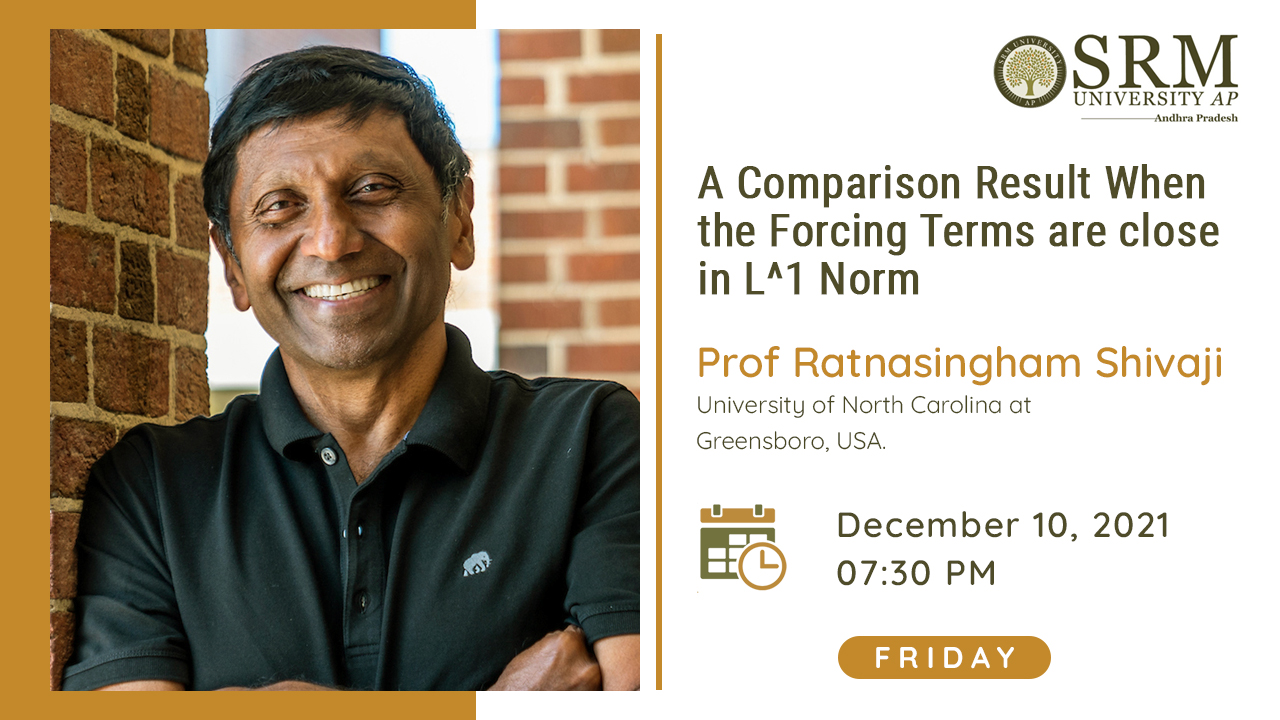 The Department of Mathematics is bringing to you the next thrilling edition of the Distinguished Lecture Series with Prof Ratnasingham Shivaji. Prof Shivaji will take the spotlight on December 10, 2021, at 7.30 pm IST and enlighten us about “A Comparison Result When the Forcing Terms are close in L^1 Norm.”
The Department of Mathematics is bringing to you the next thrilling edition of the Distinguished Lecture Series with Prof Ratnasingham Shivaji. Prof Shivaji will take the spotlight on December 10, 2021, at 7.30 pm IST and enlighten us about “A Comparison Result When the Forcing Terms are close in L^1 Norm.”
About the speaker:
Prof. Ratnasingham Shivaji received his PhD in Mathematics from Heriot-Watt University in Edinburgh, Scotland in 1981 and his B.S (first-class honours) from the University of Sri Lanka in 1977. He joined the University of North Carolina at Greensboro (UNCG) on July 1, 2011, as Head of the Department of Mathematics and Statistics and served in this position until July 31, 2019. Beginning in January of 2012, he was named H. Barton Excellence Professor. Prior to joining UNCG, he served for twenty-six years at Mississippi State University (MSU), where he was honoured as a W.L. Giles Distinguished Professor. In 2019, he was also named a Fellow of the American Mathematical Society. He is the recipient of the 2020 Mathematical Association of America (MAA) Southeastern Section Award for Distinguished University Teaching of Mathematics.
Prof. Shivaji’s area of specialization is partial differential equations, particularly in nonlinear elliptic boundary value problems. His research work has applications in combustion theory, chemical reactor theory, and population dynamics, and has been funded by the National Science Foundation and the Simon’s Foundation. Currently, he is serving as the PI on an NSF Math Ecology grant. He has authored one hundred and sixty research papers. He is a member of the Editorial Board of several mathematics journals.
Abstract:
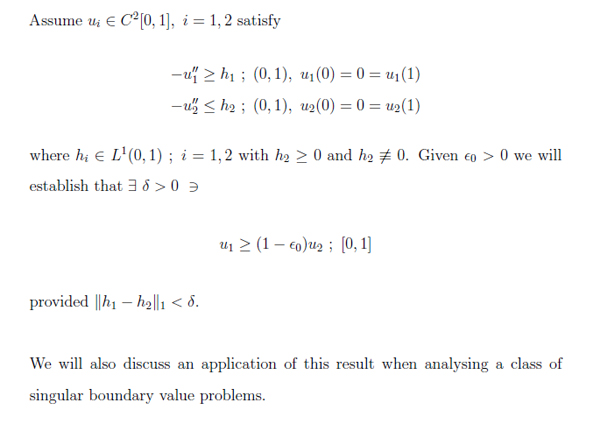
This session would provide a unique opportunity to interact with such a distinguished personality in the field of mathematics. Please make the most of this exciting opportunity on December 10, 2021, at 7.30 pm IST.
- Published in Departmental Events, Events, Math Events
Some Fascinating Features of Water Wave Propagation and Dissipation: A Mathematical Viewpoint
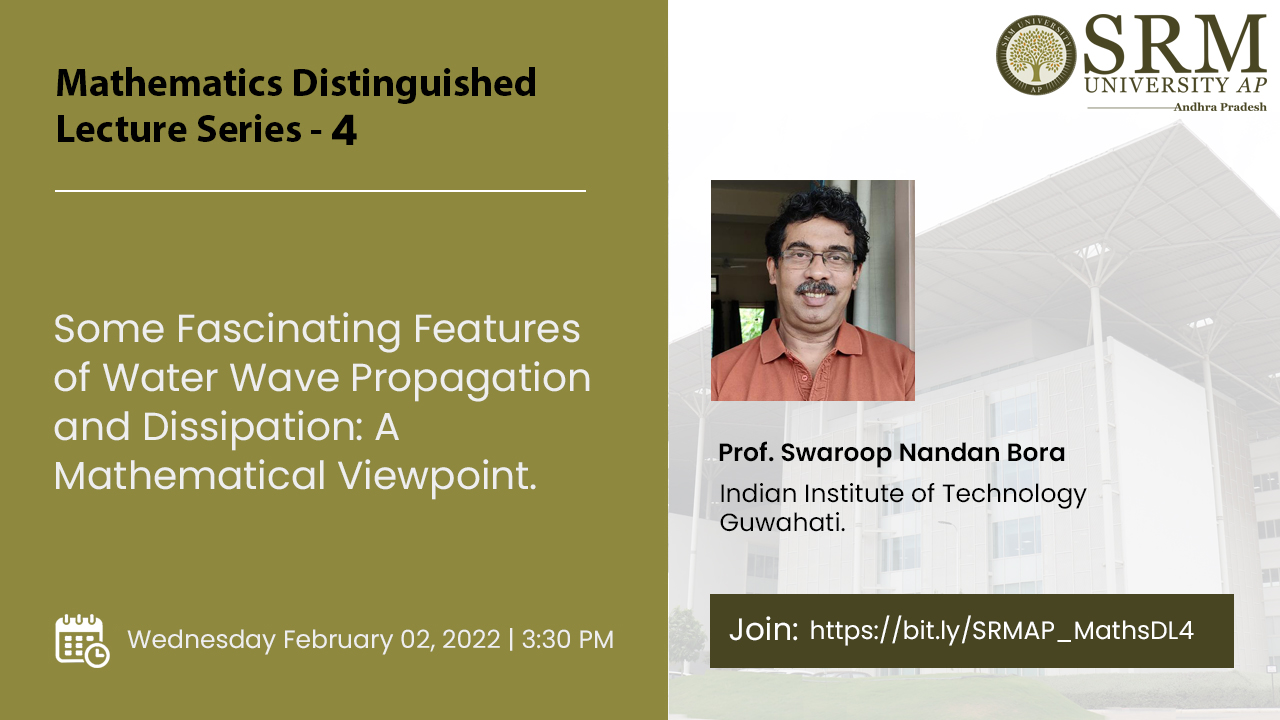 The Department of Mathematics is going to host the fourth instalment of the Distinguished Lecture on February 2, 2022, at 3:30 PM with Prof Swaroop Nandan Bora from the Indian Institute of Technology Guwahati as the keynote speaker. Dr Bora will be speaking on “Some Fascinating Features of Water Wave Propagation and Dissipation: A Mathematical Viewpoint”.
The Department of Mathematics is going to host the fourth instalment of the Distinguished Lecture on February 2, 2022, at 3:30 PM with Prof Swaroop Nandan Bora from the Indian Institute of Technology Guwahati as the keynote speaker. Dr Bora will be speaking on “Some Fascinating Features of Water Wave Propagation and Dissipation: A Mathematical Viewpoint”.
Prof Swaroop Nandan Bora received his PhD in Mathematics from Dalhousie University in Halifax, Canada. He joined the Department of Mathematics, Indian Institute of Technology Guwahati in 1999. He is also the youngest son of the renowned novelist and Padma Shri recipient Lakshmi Nandan Bora.
Prof Bora’s research interest includes Water Wave Mechanics, River Mechanics, Sloshing Dynamics, Flow through Porous Media, Differential Equation, Fractional Differential Equation. He has been elected to don the cap of the President of the Indian Society of Theoretical and Applied Mechanics (ISTAM).
Some Fascinating Features of Water Wave Propagation and Dissipation: A Mathematical Viewpoint:
Long since oceans have been serving mankind in various ways and of course, at the same time, the waves have also shown their fury at times by claiming lives and creating huge destruction. In order to understand the oceans and the strength they display through waves, it becomes very pertinent to study ocean waves, their behaviour and effects with respect to wave propagation, scattering, damping, trapping etc., which influence a number of issues in connection with marine structures and coastal regions. The comfortable situation to work with ocean waves is by considering simple conditions thereby neglecting many important aspects such as the porosity of the structures that are installed in the ocean for various activities, the porous and elastic effects of the sea-bed and also the unevenness of the sea-bed. However, the real situation demands that some or all of these be taken into account while modelling a problem so that the problem is formulated for a more realistic scenario.
In order to reduce the wave impact on marine structures (i.e., to dissipate the wave effects), it is essential that the structures (such as cylinders, barriers, caissons) possess in them the ability to reflect the wave and help in attenuating the wave energy. This brings into fore the utility of porous structures which can be used as breakwaters in the coastal and offshore regions for various applications. Further, it is practically impossible to find sea-beds that are flat and do not possess any porosity or elasticity. In other words, a more realistic formulation can be carried out by considering structures possessing porosity, and sea-beds being uneven and possessing porosity and/or elasticity.
The objective of this talk is to discuss the scattering of water waves by various types of porous structures placed on flat or uneven sea-bed which may possess porosity and/or elasticity. The study focuses on how reflection varies when different important parameters are changed. The observations made from this study will allow one to design structures that will be effective enough to reduce wave impact on the structures. In this talk, some results will be displayed which portray the physical scenario. An attempt will be made to present some practical problems which take into account a number of important properties and parameters so that the results become practical to be followed by relevant people for various activities with regard to protecting certain regions and structures from harsh ocean wave action. It will mainly emphasize the significant role that porosity and elasticity play with regard to ocean wave propagation and various related issues. The emphasis will be on the modelling of the problems which will establish the essence of mathematics.
A brief and friendly introduction to water wave propagation will precede the main components of the talk to give some general idea to the audience.
Join the exciting Lecture on February 2, 2022, at 3:30 PM with Prof Swaroop Nandan Bora.
- Published in Events, Math Events
Breaking the Mathematics myth
Have you ever thought Mathematics is a hard nut to crack? The Department of Mathematics brings to you Dr Rossi D’Souza to break the myth associated with Math. The seminar will be held on March 28, 2022 at 03.45 pm IST. Dr D’Souza, from Homi Bhabha Centre for Science will deliver a talk on ‘Why is the relationship between Mathematics, Education & Society important for research?’.
Abstract of the Talk
“Mathematics is hard!” has been a universal refrain among school children (and often their parents) for as long as we recall. But why do so many children dislike Mathematics? Is it the way Mathematics is taught – because Math teachers follow a “rote-learning” approach instead of making sure students understand the basic concepts? Why are students from marginalized backgrounds/identities disproportionately lagging behind in & excluded from Mathematics knowledge production? Or is Mathematics really not for everybody?
Drawing on experience from his PhD research with visually challenged students and industry experience the speaker will highlight the importance of taking into account the social factors in Mathematics Education Research to effectively address the challenges posed by STEM Education – and to work towards a world where Mathematics really is for everybody!
Speaker’s Profile
Dr Rossi D’Souza recently completed his PhD in Mathematics education from HBCSE-TIFR. His research interests include exploring how ableism operates in Mathematics education. Prior to working as a Research scholar, Rossi completed his M.Tech in Modeling and Simulation from Pune University, specializing in and then working in the field of Computational Genomics. He has also worked as a visiting lecturer at Govt. Polytechnic Mumbai, as a medical instrument repairman at Narayana Hrudayalaya Hospital, Bangalore and as a Science Communicator on the Science Express train.
Join the session with Dr D’Souza and make your Mathematics learning a delightful experience.
- Published in Departmental Events, Events, Math Events
Scalar conservation laws in one space dimension with strict convex flux
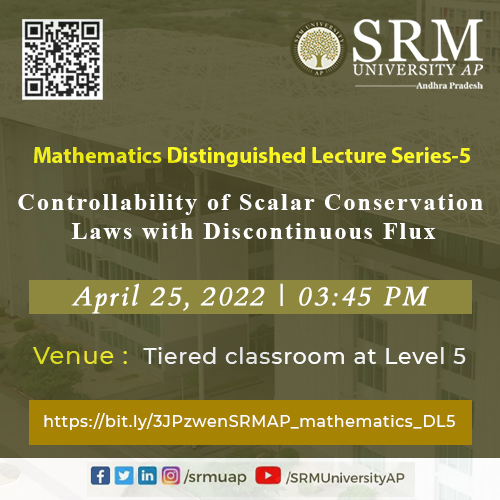
The Department of Mathematics is arranging the fifth instalment of the Departmental Distinguished Lecture Series on April 25, 2022, at 3.45 pm IST. Reputed Mathematician, Prof A Adimurthi will deliver an informative lecture on the topic ‘Controllability of Scalar Conservation Laws with Discontinuous Flux’.
About the Talk
Navier-Stokes and Euler equations play an important role in studying the flow of incompressible fluids. Weak solutions to these equations can be obtained by Galerkin method but the uniqueness is a big open problem. It is a big challenge to obtain an extra condition for the class of functions, so that in this class obtain the existence and uniqueness. To understand this phenomenon, it is better to look at a one-dimensional case where the equation turns out to be viscous Burger’s equation or Burger’s equation with non-linearity is of quadratic order. In this talk, we will restrict to Burger’s type equations called the Scalar Conservation Laws in one space dimension with strict convex flux. Way back in the 50’s, this equation was studied by Lax and Oleinik and obtained an explicit formula for a solution. Oleinik showed that this satisfies an extraction called the Entropy Condition and then showed that in this class, the solution is unique. Later Kruzkov, in an ingenious way, generalized this to obtain a unique solution for Scalar Conservation Law in higher dimensions and Lipschitz fluxes. This result was taken up by Zuazua and his collaborators and studied the Optimal Controllability for Burgers equation. They showed the existence of optimal control and to capture this, they derived a numerical algorithm whose convergence is still open. In a different direction, this was attacked, and the problem was completely solved. Getting the optimal solution is via projection method in a Hilbert space. Recently, this was extended in a non-trivial way to conservation laws with convex discontinuous flux. The talk will explain the main ideas of this work.
About the Speaker
A mathematician of repute, Prof A Adimurthi has been associated with the Tata Institute of Fundamental Research, Centre for Applicable Mathematics Bangalore. At present, he is working as a visiting professor at the Department of Mathematics and Statistics, IIT Kanpur. He has authored more than a hundred research articles on a wide range of topics including Partial differential equations, Functional analysis, Numerical analysis, Calculus of variations, Optimal control, and many others. Prof Adi Adimurthi has been elected as a fellow of; The Indian Academy of Sciences (F.A.Sc) Bengaluru (1996), The National Academy of Sciences (F.N.A.Sc), India in 1997, The Indian National Science Academy (F.N.A) in 1998, The World Academy of Sciences(TWAS) in 2018, Raja Ramanna and DST J.C. Bose National. Along with these fellowships, Professor Adimurthi has also been honoured with the prestigious Dr Zakir Hussain Award in 2013.
Join this informative talk with Prof A Adimurthi on April 25, 2022 at 3.45 pm IST.
- Published in Departmental Events, Events, Math Events
Vector Bundles: Sixth distinguished lecture from the Department of Mathematics
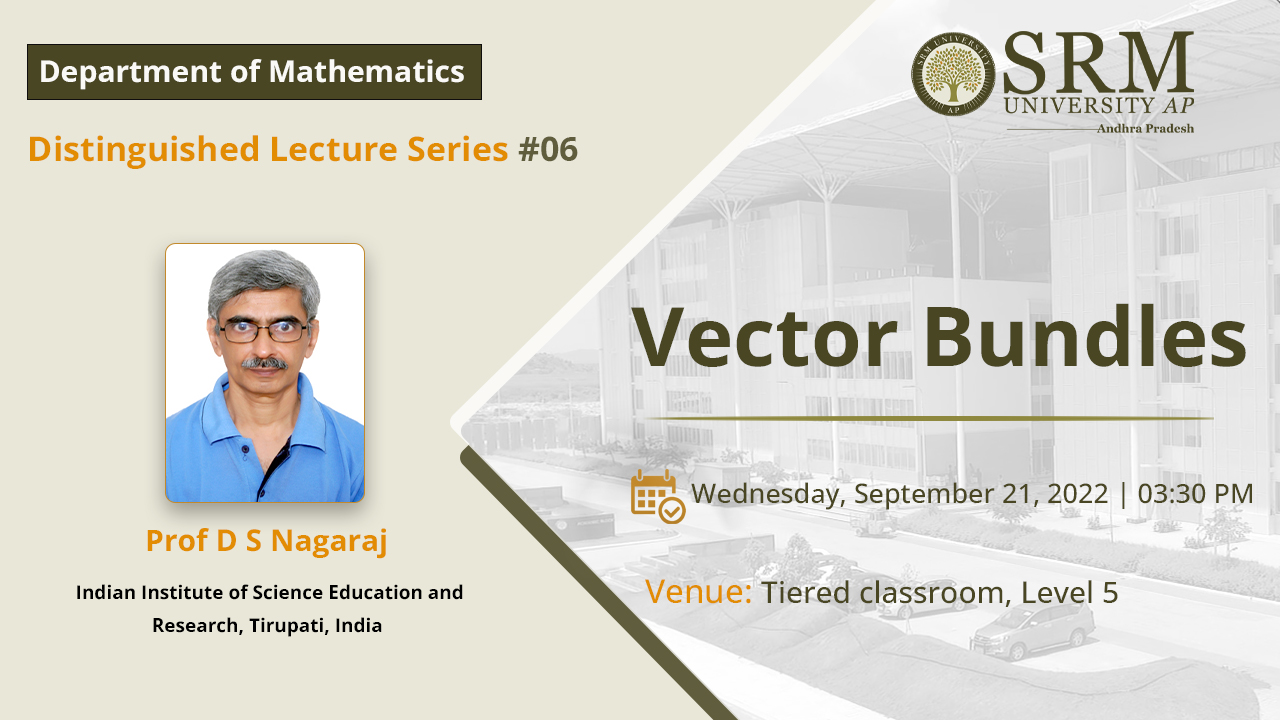 The concept of vector spaces and linear maps between vector spaces are used in all branches of mathematics. The Department of Mathematics is organising the sixth distinguished lecture Vector Bundles in affiliation with the Indian Institute of Science Education and Research, Tirupati, India. Renowned Indian Mathematician Prof D S Nagaraj is the keynote speaker of the lecture.
The concept of vector spaces and linear maps between vector spaces are used in all branches of mathematics. The Department of Mathematics is organising the sixth distinguished lecture Vector Bundles in affiliation with the Indian Institute of Science Education and Research, Tirupati, India. Renowned Indian Mathematician Prof D S Nagaraj is the keynote speaker of the lecture.
Date: September 21, 2022
Time: 3.30 PM
Venue: Tiered classroom, Level 5
The talk will explain the concept of vector bundles and mapping between vector bundles, a natural generalisation of vector spaces, and linear mapping between vector spaces. The concept of vector bundles and mapping between them is helpful in several advanced branches of mathematics.
About the speaker
Prof D S Nagaraj did his PhD from the Tata Institute of Fundamental Research (TIFR), Mumbai. He was a professor at the Institute of Mathematical Science (IMSc), Chennai, one of the premier research institutes in India. After his retirement in 2018 from IMSc, he joined as a professor at IISER, Tirupati, and currently is the head of the Mathematics Department there. A conference on the occasion of his sixtieth birthday was held at IMSc in 2018 to celebrate his works. His areas of interest include Algebraic Geometry, Commutative Algebra, and Number Theory. His profound scholarship on the subject influenced many young scholars who later became well-established mathematicians. He is exceptionally generous and approachable to young students who would try to learn algebraic geometry for the first time. He has significantly impacted a generation of mathematicians as a researcher and a great teacher. He was elected as a fellow of the Indian academy of sciences in 2010 and 2017.
Join the lecture through the zoom link!
- Published in Departmental Events, Events, Math Events, University Distinguished Lecture
- 1
- 2


